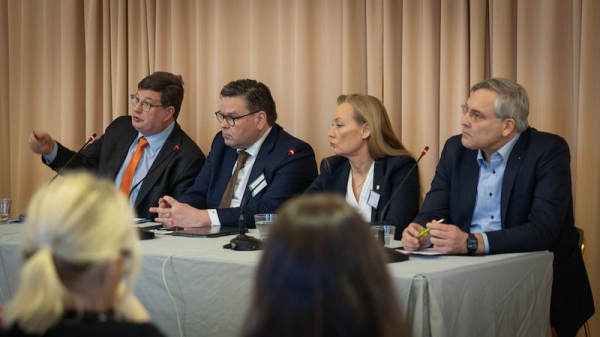
At the Finland’s Economic Growth and Workplace Equality seminar, panelists included Minister of Employment Arto Satonen, Rastor Institute Chairman Anssi Kujala, Akava Chair Maria Löfgren, and Suomen Yrittäjät CEO Mikael Pentikäinen.
- Next Article Finnish schools take different approaches to Ramadan fasting
Finland needs skilled foreign workers to sustain its economy, but outdated attitudes and rigid language requirements are still major obstacles to employment, experts warned at a seminar on Tuesday.
The event, organised by Rastor Institute, brought together policymakers, business leaders and migrants to discuss the challenges of integrating foreign professionals into the workforce.
Many highly educated migrants struggle to find jobs that match their skills, despite years of effort and fluency in Finnish.
Omolara Odediran, a Nigerian-trained teacher with additional degrees from European universities, has faced constant rejection. “The answer was always no,” she said.
Raja Rymbai, a former journalist with experience in international organisations, has spent years looking for work in Finland. “I hope that one day the right person at the right company will notice my CV,” he said.
Sosionomi and philosophy graduate Cucu Wesseh, who has worked short-term jobs in Finland for two decades, dreams of a leadership role in healthcare. “Employers should see people as individuals. Diversity is a strength,” he said.
The seminar highlighted that Finland is failing to utilise the skills of educated migrants, even those with strong language skills and years of work experience.
Labour Minister Arto Satonen stressed that Finland’s demographic trends make immigration essential. “Every year, 10,000 more people retire than enter the workforce. Finland cannot cope without skilled labour,” he said.
Experts identified key challenges: employer attitudes, strict language requirements and lack of professional networks. Toni Berkowits, CEO of Rastor Institute, pointed out that foreign job seekers need to apply five times more often than native Finns to get an interview.
Proposed solutions included mentorship programmes, better access to internships and a cultural shift towards inclusivity. Satonen suggested expanding workplace learning initiatives. “A master-apprentice model could help companies integrate more migrants,” he said.
Mikael Pentikäinen, CEO of the Federation of Finnish Enterprises, acknowledged the deep-rooted problem of discrimination. “Racism is embedded in our society, and we must eliminate it. This is not just the responsibility of employers but of all workers,” he said.
He also called for less regulation around language requirements. “Employers should be trusted to decide what language skills a job requires.”
Maria Löfgren, President of Akava, the confederation of professional unions, praised Finland’s anti-discrimination laws but noted that many workers hesitate to report bias. “We need to make it easier for people to challenge discrimination without feeling isolated,” she said.
Löfgren also stressed the importance of supporting language learning in daily life. “We assume Finnish is impossibly difficult. In casual conversations, we switch to English too quickly. We should encourage learning instead of defaulting to English,” she said.
The seminar concluded that meaningful change starts with small actions—offering one interview, one mentorship or one internship could make a crucial difference for a skilled migrant and benefit businesses in the process.
Rastor Institute is supporting migrant employment by providing free diversity training for companies through its Työelämäteko programme. “Our goal is that everyone who moves to Finland can work in a job that matches their skills and education,” said Anssi Kujala, Chair of Rastor Institute.
HT
- Next Article Finnish schools take different approaches to Ramadan fasting
Source: www.helsinkitimes.fi
